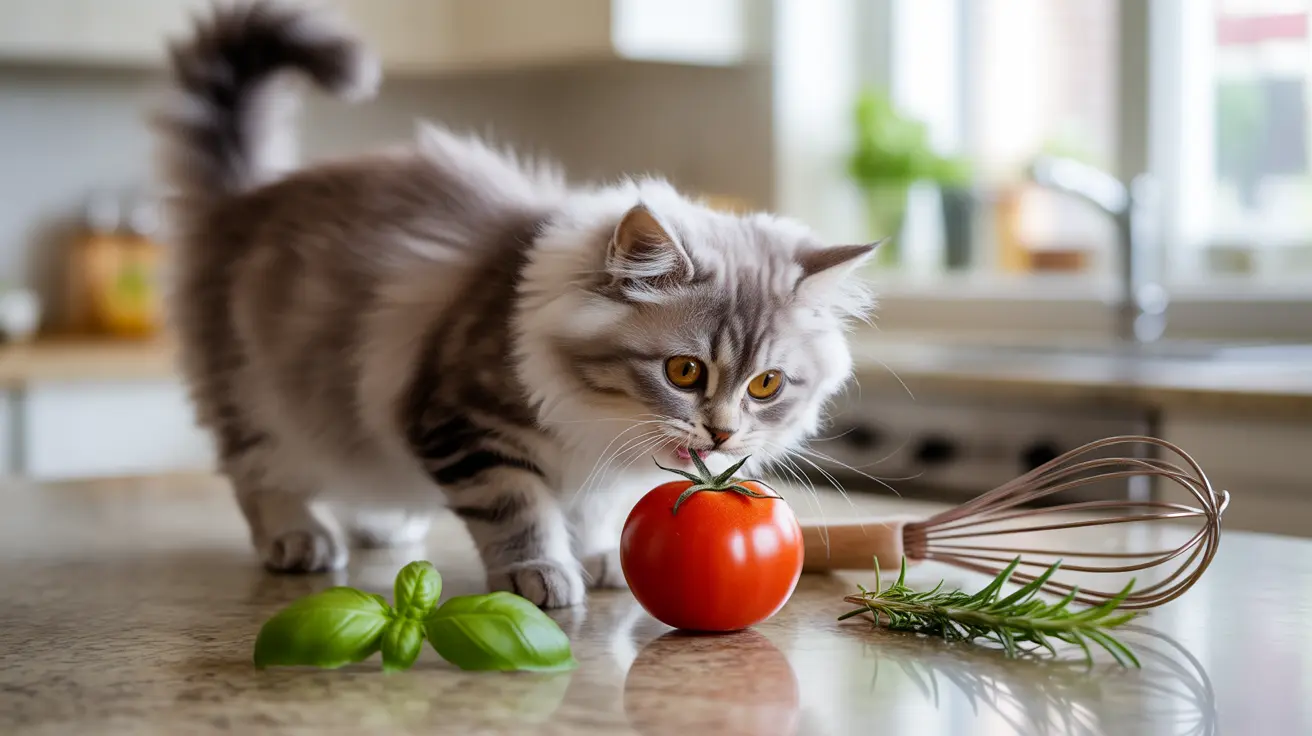Understanding Tomato Safety for Cats
Ripe red tomatoes are generally safe for cats in very small quantities. However, this doesn't mean you should make tomatoes a regular part of your cat's diet. As obligate carnivores, cats have no biological need for fruits or vegetables, and tomatoes offer minimal nutritional benefits for them.
The most important distinction is between the ripe fruit and other parts of the tomato plant. While a small bite of ripe tomato won't harm your cat, the green parts of the plant contain dangerous compounds that could lead to serious health issues.
The Dangers of Tomato Plants
Tomato plants belong to the nightshade family (Solanaceae), which is known for producing toxic compounds. The green parts of tomato plants - including leaves, stems, and unripe tomatoes - contain solanine and tomatine, two alkaloids that are toxic to cats.
These toxic compounds can cause various symptoms, including:
- Severe gastrointestinal upset
- Lethargy and weakness
- Loss of coordination
- Cardiac effects
- Depression
- Dilated pupils
Safe vs. Unsafe Tomato Products
While a small amount of fresh, ripe tomato might be safe, many tomato-based products should be completely avoided. Here's what you need to know:
Safe (in very small amounts):
- Fresh, ripe red tomatoes (without stems or leaves)
- Carefully cut, ripe cherry tomatoes
Unsafe:
- Green tomatoes
- Tomato plants and leaves
- Tomato sauce
- Ketchup
- Tomato soup
- Canned tomatoes
- Commercial tomato products
Tomatoes and Your Cat's Diet
Cats are strict carnivores, meaning their bodies are designed to digest and utilize nutrients from meat sources. Unlike humans, cats don't need the vitamins and antioxidants found in tomatoes, as they get these nutrients from their meat-based diet.
If you're considering adding any human food to your cat's diet, it's always best to consult with your veterinarian first. They can provide personalized advice based on your cat's specific health needs and conditions.
Signs of Tomato Poisoning in Cats
If your cat has consumed toxic parts of a tomato plant or large quantities of tomato-based products, watch for these warning signs:
- Excessive drooling
- Vomiting
- Diarrhea
- Abdominal pain
- Drowsiness
- Confusion
- Behavioral changes
If you notice any of these symptoms, contact your veterinarian immediately. Quick action can prevent serious complications.
Frequently Asked Questions
Can cats safely eat ripe red tomatoes, and how much is okay?
Yes, cats can safely eat small amounts of ripe red tomatoes. However, portions should be limited to a tiny bite or two as an occasional treat, not as a regular part of their diet.
What parts of tomato plants are toxic to cats and why?
The leaves, stems, and green unripe tomatoes are toxic to cats because they contain solanine and tomatine, alkaloids that can cause severe gastrointestinal and neurological symptoms when ingested.
Are tomato-based products like sauce or ketchup safe for cats to consume?
No, tomato-based products like sauce and ketchup are not safe for cats. These products often contain additional ingredients like onions, garlic, salt, and spices that can be harmful to cats.
What symptoms should I watch for if my cat eats unripe tomatoes or tomato plant parts?
Watch for symptoms including vomiting, diarrhea, lethargy, drooling, confusion, dilated pupils, and changes in behavior. If you notice any of these signs, seek immediate veterinary care.
Why don't tomatoes provide nutritional benefits for cats despite their vitamins?
Cats are obligate carnivores whose bodies are designed to obtain nutrients from meat sources. They cannot efficiently process or utilize many plant-based nutrients, making tomatoes nutritionally unnecessary for their diet.
Conclusion
While ripe tomatoes aren't strictly toxic to cats, they offer no nutritional benefits and could pose risks if consumed in large quantities or if the wrong parts are eaten. The safest approach is to keep tomato plants out of your cat's reach and avoid feeding them tomato-based products. Instead, stick to a high-quality cat food diet and veterinarian-approved treats to ensure your feline friend stays healthy and happy.






